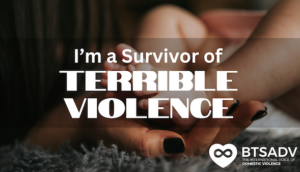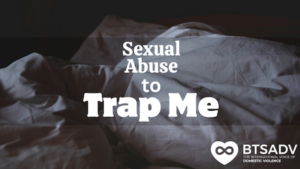You’ve had enough.
You’ve made plans to leave and have everything ready.
You know you don’t deserve the maltreatment and abuse that you are subject to day after day at the hands of your intimate partner.
It’s time to finally flee.
But, he loves you.
And you love him.
He’s the only person who truly understands and cares for you.
An indescribable force forbids you from deserting the relationship.
What is Trauma Bonding?
This “indescribable force” is known as trauma bonding. Lack of money/resources, nowhere to go, and fear are often brought up when listing reasons why a victim of domestic violence (DV)— aka intimate partner violence (IPV)—refuses to leave or returns to their abuser. Of course, these are all valid reasons why a person may choose to stay in an unhealthy relationship; however, trauma bonding describes a less measurable, less visible reason many victims have a difficult time leaving their abuser. The term trauma bonding is a relatively new concept first used by Patrick Carnes to describe “the misuse of fear, excitement, sexual feelings, and sexual physiology to entangle another person [1].”
How does it relate to abuse?
Trauma bonding directly ties into the cycle of abuse that is often discussed with IPV. In this cycle, the abused person learns to associate the violent episode with the showering of love and affection that follows. Because the victim feels intense love and care from the abuser during the crisis and honeymoon phase, they often believe that the abuse that follows is due to something they have done, and therefore, something they can change/control. This is especially true for people who were also victims of abuse in their childhood [2]; for them, every form of “love” they have received, has followed abuse. Ultimately, these intense feelings of love and excitement followed by neglect and abuse create a chemical and hormonal bond between the abused and abuser [3]. The “indescribable force” of this bond is often confused with love by the abused person. You are not alone if you feel love for your abuser; however, it is crucial that you can recognize signs of a trauma bond and learn ways to break free from this force.
Signs of a Trauma Bond
- You realize your partner is mistreating you, but continue to make excuses for them.
In your eyes, every act of abuse is meant with good intentions. They are keeping you from your friends and family because they want to spend all their time with you. Yes, your partner calls you degrading names, but it’s only because they were bullied as a child. You may even blame the abuse on yourself, deciding that you must not have given your partner enough love.
- You have a hard time imagining life without your abuser.
The idea of leaving your partner is hard to fathom. You may even want to leave, but feel a sense of panic every time you think of life without your partner. The abuse that your partner disguises as “love” creates intense feelings inside of you, making it extremely difficult to break the bond and end the relationship.
- The belief that things will “go back to normal” one day.
The memory of when your partner and you first started dating is still fresh. They used to give you butterflies in your stomach, shower you with gifts, and make you feel like the most important person in the world. You know your partner is capable of being that person again; you just need to figure out a way to “fix” them. According to Psychology Today, a narcissist (the abuser) will first “love bomb” their intimate partner to gain trust. Next, they condition their partner to depend on them for love and affection. Once they feel they have the victim “under their hold”, they will gradually start the cycle of abuse. The more the victim fights for the abuser’s love, the stronger the trauma bond becomes, and the more control the abuser gains.
Breaking Free of the Bond
- Education. Good news! If you believe you might be experiencing a trauma bond, you are already taking the first steps of breaking free by reading this article. The more you know about the cycle of abuse, narcissistic behavior, and the signs/processes of trauma bonding, the easier it will be to recognize these behaviors in your own relationship. To add, reading about others’ experiences in similar situations can make you feel less alone and more motivated to succeed in breaking the bond.
- Separate yourself from your abuser. You need to completely cut your abuser off. This, of course, is easier said than done, but once you are able to maintain no contact with the person you are bonded with, the hormones that made you feel “addicted” to your abuser will die down [3].
- Keep yourself busy. When you are in the no contact phase, your thoughts will likely be consumed by your abuser. A good way to fight these thoughts is to stay focused on other things—catch up with old friends, start going to counseling, join a club, volunteer.
The important thing to remember if you think you may be stuck in a trauma bond with an abusive partner is that you are not alone. It is justifiable that you have feelings of love for someone with whom you have shared intimate and emotional moments, especially when the relationship started with a showering of affection. However, if while reading this article you were reminded of your own relationship, it is time to focus on breaking free of the bond.
Photo Credit: Marcis Berzins, via Unsplash
References
[1] Samsel, M. (2018). Trauma bonding. Abuse and relationships. https://www.abuseandrelationships.org/Content/Survivors/trauma_bonding.html
[2] Carbone, N. (2019, August 8). How to recognize the signs of trauma bonding. Pysch Central. https://psychcentral.com/blog/how-to-recognize-the-signs-of-trauma-bonding/
[3] Leigh, H. (2019, Nov 22). Recognizing and breaking a trauma bond. CPTSD Foundation. https://cptsdfoundation.org/2019/11/22/recognizing-and-breaking-a-trauma-bond/
[4] Greenberg, E. (2018, Jan 21). Why is it so hard to leave the narcissist in your life? Psychology Today. https://www.psychologytoday.com/us/blog/understanding-narcissism/201801/why-is-it-so-hard-leave-the-narcissist-in-your-life










